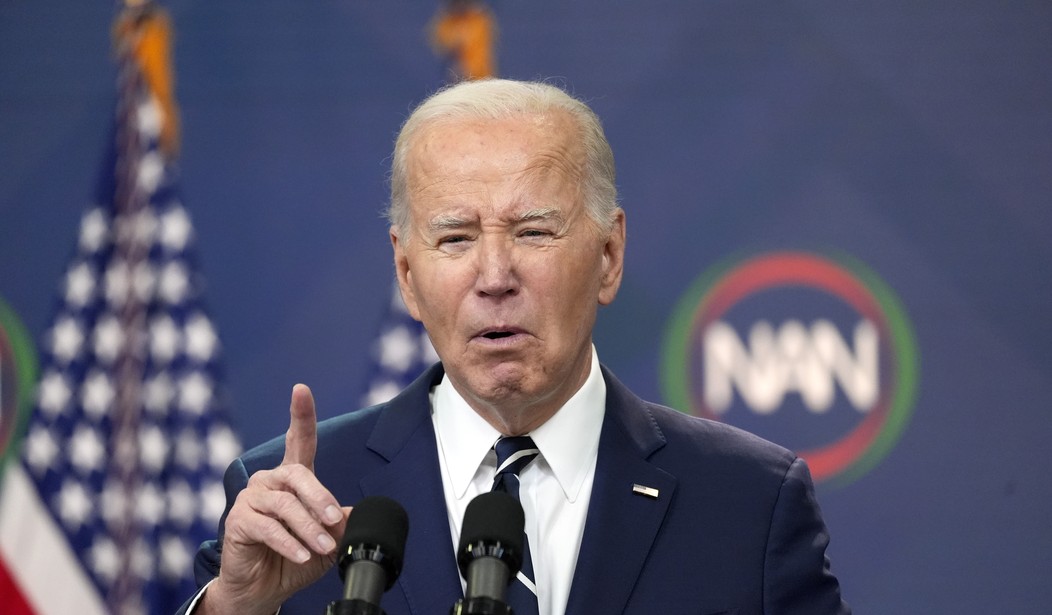Let's face it -- we can also skip the qualifier "on Iran," too. However, let's not quibble when a mainstream media outlet manages to squint long enough to see that Joe Biden's strategic new clothes are entirely non-existent.
Politico's Nahal Toosi puts it bluntly: "There is no Biden strategy for Iran." And even worse, sources in the White House tell her that their tactic in handling Biden is mainly to play keep-away on this conflict:
The Islamist regime in Tehran is, by many measures, at the root of much of the destabilization across the Middle East and more of a threat to U.S. interests than ever before. Iran is on the verge of obtaining a nuclear bomb. Its proxy militias are spreading mayhem outside its borders. It has stomped out internal revolts, and — as shown by its recent attack on Israel — the regime’s ballistic missile program is going strong.
But for most of Biden’s time as president, his aides’ No. 1 goal hasn’t been to solve this puzzle, but to keep it off the president’s desk.
“The strategy is to keep it on low boil on all fronts — nuclear, regional, whatever. That’s been the approach for some time now,” said a second U.S. official, who, like several other people I spoke to for this column, is familiar with U.S. Middle East policy and was granted anonymity to discuss a sensitive issue.
So how's that "low boil" plan working out? Until October 7, the Biden White House could pretend that the lack of a conflict was a credit to Biden's leadership. In fact, that's exactly what Biden's nat-sec adviser Jake Sullivan claimed that "the Middle East was quieter than it was in decades," just eight days before Iranian proxy terror network Hamas launched a massive and grotesque rampage of murder and rape across southern Israel.
Eight days after that, Sullivan was still trying to promote the "low boil" argument, with NBC's Kristen Welker clearly skeptical:
The "strategy" that supposedly produced the quiet was the Biden/Barack Obama Iran-appeasement campaign. Given that the same team worked in both the Obama and Biden administrations, it's plain to see that the same people are making the decisions around Iran. And thus far, both administrations have plied the mullahs with tons of cash and access to markets, and both administrations got rewarded with Iranian-backed wars -- Obama in Syria, where Tehran (and Moscow) kept Bashar al-Assad propped up in power, Hezbollah action in Lebanon, and a major outbreak of war in Gaza. All of those took place during the Obama years, perhaps the last time Jake Sullivan was as busy as he is now on Middle East affairs.
That is not a coincidence. Empowering Iran has unleashed conflicts in the region that threaten a wider and much more consequential war, and thus far the only 'strategy' that Biden'a team has managed to employ is to ask Israel to take a pass on defending itself. That kind of appeasement may momentarily make things "quieter," but it only encourages even more violence from Iran and all its other proxies. The Houthis have managed to impact global shipping now, and the region's unrest will have economic consequences around the world for a long time to come.
Toosi hits the nail on the head when she distinguishes between tactics and strategy. She finds Biden and his team long on the former and entirely empty on the latter:
I’ve come to believe that if the end goal of your effort isn’t to solve a problem, then you don’t have a strategy.
So when policy wonks use words like “containment,” “de-escalation,” “deterrence” and “risk management” to describe Biden’s approach to Iran, I hear only tactics, not strategies.
He believes Iran is a problem, but doesn’t appear to have a coherent plan for how to solve it.
Is that true, though? Biden's actions thus far make it appear that he considers Israel to be the problem, not Iran. And even more specifically, Biden's actions and those of his team focus on Benjamin Netanyahu as the primary problem in the region, so much so that Biden endorsed Chuck Schumer's demand for regime change in Jerusalem without ever discussing regime change in Tehran.
That point aside, Toosi is correct when she declares Biden's foreign policy in the Middle East to be all tactics and no strategy. But that's been true of Biden's foreign policy generally as well. It's all reactive; there has been no effort to shape events, but instead to essentially make things up on the fly as others take action.
Even the one strategy that Toosi credits to Biden -- "regional integration" -- belongs to Trump in the Abraham Accords. And how did Trump manage to start that process? By making clear that the US backed the Sunni Arab nations against their Shi'ite Iranian opponents through Trump's "maximum pressure" campaign on Iran.
That's a strategy.
Biden doesn't have a strategy, and neither does his team. They are trying to claim credit for 'regional integration' while making everything else up on the fly. And in doing so, they have managed to set the region on fire by giving the arsonists access to nearly unlimited funds for their regional terrorism.
That's not a strategy. It's madness. And it's high time that the rest of the Protection Racket Media recognize it, before Biden and his team of incompetents get more people killed.








Join the conversation as a VIP Member